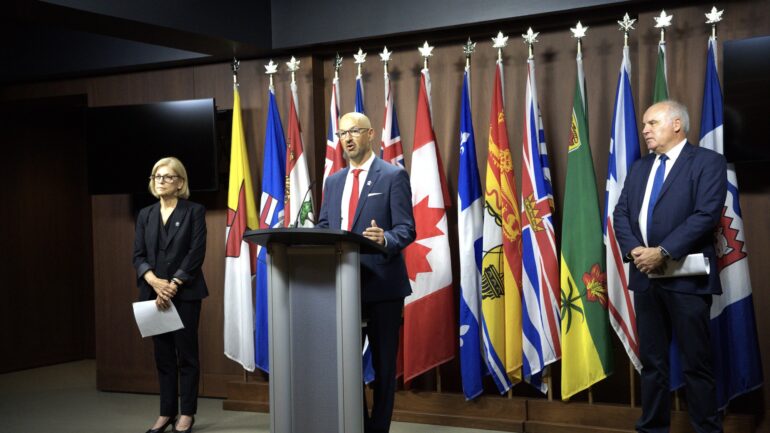The National Allied Golf Association (NAGA) and Golf Canada celebrated National Golf Day by releasing a new study that showed the sport added $23.2 billion to the country’s GDP last year.
The 2023 Canadian Golf Economic Impact Study, revealed May 23, also found the industry supports almost 237,000 person-years of employment, providing $14.2 billion in income.
Jeff Calderwood, the CEO of the National Golf Course Owners Association Canada and chair of NAGA, said the industry provided $4.7 billion in tax revenue.
He was joined by Laurence Applebaum, CEO of Golf Canada, in presenting the study’s findings on Parliament Hill on May 23.
“Our goal today is to communicate and celebrate the economic health, social, charitable, environmental, and business benefits that golf brings to Canadians,” Calderwood said. “Welcome to National Golf Day.”

The National Allied Golf Association (NAGA) standing on Parliament Hill on Thursday, May 23. Photo credit: NAGA
The study, now in its fourth cycle of publication, dissects the Canadian golf economy, consumer demand and the supply of golf.
The data collected for this study was collected through two online surveys, The Golfer Survey and the Operator Survey, which received responses from close to 476 Canadian golf course operators and more than 12,000 Canadian golfers.
“We are excited to unveil the results of the 2023 Golf Economic Impact Study which unequivocally shows that golf is not just great for Canadians, but it’s great for Canada,” Calderwood said.
He said the money generated by the sport highlights golf’s role in driving economic growth and creating employment opportunities across the country.
The report also found the game of golf becoming diversified, with an increase of six per cent in female golfers and 33 per cent increase in Black, Indigenous and People of Colour golfers in 2023 alone.
“Golf participation in Canada is thriving,” Calderwood said.
Applebaum, who was named CEO in 2017, found the industry’s resilience during the COVID-19 pandemic was one of the most important findings of the report.
“One of the most note-worthy findings from the report is the industry’s remarkable return post-COVID, despite all of its challenges,” Applebaum said.
The report found many golfers valued the opportunity to be outdoors and that golf provided a crucial mental health boost.
“Golf not only brings economic contributions to Canadians, but a holistic solution to mental health and physical health,” Applebaum said. “It’s important to get together with colleagues, family and friends to play a game that we love.
“Golf is one of the magic parallels to life,” he said. “It teaches resilience, patience and perseverance.”

Laurence Applebaum, CEO of Golf Canada addressing the crowd, joined by Jeff Calderwood, CEO of the National Golf Course Owners Association Canada and Chair of NAGA and Louise Parry. Photo credit: NAGA
The report additionally highlighted environmental stewardship, with many golf courses and associations adopting sustainable practices to minimize their ecological footprint.
The U.S. Environmental Protection Agency (EPA) published a risk assessment in May 2023 showing the significant risks to human health associated with the herbicide dimethyl tetrachloroterephthalate (DCPA).
This herbicide has been used on turfs since the ‘50s and was permitted to be sprayed on Canadian fields until December 2023.
Impact Public Affairs, Golf Canada’s public relations, did not respond to a question asked regarding the use of pesticides on Canadian golf courses.

